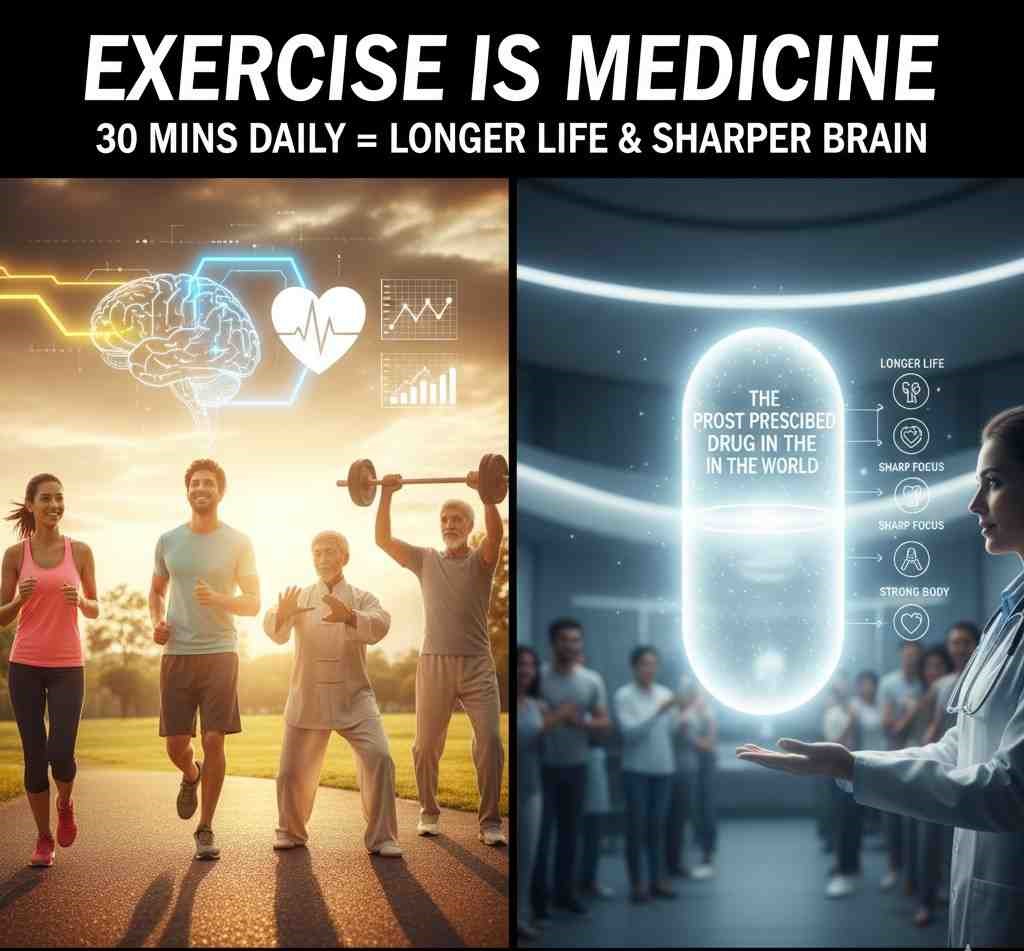October 3, 2025 — Global Health News
A groundbreaking new study has confirmed what fitness enthusiasts have long believed: just 30 minutes of daily exercise can significantly extend life expectancy, sharpen the brain, and lower the risk of chronic diseases.
The research, conducted by an international team of scientists across 15 countries and involving more than 500,000 participants, provides some of the strongest evidence to date that consistent physical activity is a powerful prescription for better health and longevity.
🏃 The Study’s Findings
The study tracked participants over a period of 10 years, analyzing the effects of different types and intensities of exercise on long-term health. Results showed that:
- 30 minutes of brisk walking or moderate exercise daily reduced the risk of premature death by 28%.
- High-intensity workouts such as running, swimming, or cycling for at least 150 minutes per week cut the risk of heart disease and stroke by nearly 40%.
- Exercise was strongly linked to better brain function, with participants showing up to 25% lower risk of dementia and cognitive decline.
- Those who maintained regular physical activity had healthier blood sugar levels, improved sleep patterns, and stronger immune systems.
🧠 Exercise and Mental Health
Beyond physical benefits, the study highlighted a major impact on mental well-being. Regular exercisers reported:
- Lower rates of anxiety and depression
- Improved mood and energy levels
- Greater resilience against stress
One of the lead researchers explained, “Our data confirms that exercise is not just about muscle or weight — it’s medicine for the brain. The mental health benefits are as powerful as the physical ones.”
🩺 Doctors Push for “Exercise as Medicine”
With chronic illnesses like diabetes, obesity, and hypertension on the rise worldwide, doctors are now calling for exercise to be prescribed just like medication.
Hospitals in several countries are already piloting “Exercise Clinics,” where patients receive personalized fitness prescriptions alongside traditional treatments. Experts believe this approach could save billions in healthcare costs by preventing disease before it takes root.
💡 What Type of Exercise Works Best?
The study revealed that any form of movement counts. From walking and yoga to weightlifting and sports, all physical activity had positive effects. However, a mix of activities appeared to provide the strongest benefits:
- Cardio (walking, jogging, swimming) for heart and lung health
- Strength training (weights, resistance bands) for bones and muscles
- Flexibility & balance (yoga, pilates, tai chi) for mobility and injury prevention
Experts recommend at least 150 minutes of moderate activity per week or 75 minutes of vigorous activity, combined with muscle-strengthening exercises twice a week.
🌍 Global Lifestyle Shift
The findings arrive at a time when sedentary lifestyles are fueling a global health crisis. WHO estimates that 1 in 4 adults worldwide do not meet recommended activity levels, leading to increased risks of obesity, heart disease, and early death.
Governments are being urged to invest in public parks, cycling lanes, and community fitness programs to make exercise more accessible to all, regardless of age or income.
✅ Conclusion
The message from this latest research is clear: exercise is one of the most powerful tools for a longer, healthier, and happier life. It’s free, widely available, and has virtually no side effects — yet its benefits rival the most advanced medicines in modern science.
As the study’s authors put it: “If we could put the benefits of exercise into a pill, it would be the most prescribed drug in the world.”

